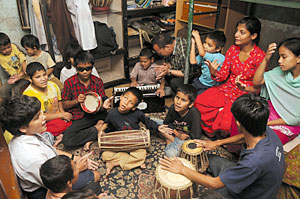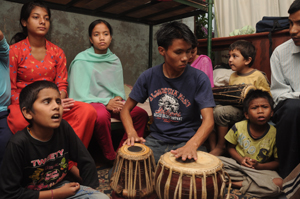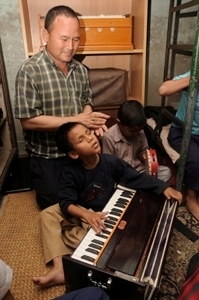 ALL PICS : BIKRAM RAI |
Not so far from Kathmandu's squalid suburbs lies the village of Bungmati which this time of year is surrounded with the yellow terraces of ripening rice. There are red houses with thatch roofs amidst a backdrop of a deep blue sky and a horizon of mountains beyond.
But besides its picturesque landscape and its fame for being the home of the Matsendranath chariot festival, Bungmati is also the proud host to a very special school.
Thanks to the vision, compassion and tenacity of Dayaram Maharjan, Bungmati's Adarsha Shaulah Yuwak Higher Secondary School has in the last 20 years helped hundreds of children with disabilities. In a country where handicapped children are often refused admission into schools which have no facilities or training to work with them, Maharjan's school stands out as a shining beacon of hope.
 |
In fact, Adarsha Shaulah is a model for integrating children with disabilities into mainstream education and also provides free education and boarding to 32 children with disabilities from all over the country.
It all began in 1990, when a blind student was admitted into the school but couldn't do well in class due to his disability. Maharjan felt the child deserved the same chance as everyone else. But instead of looking for benefactors, he enrolled himself for Braille lessons. "Learning Braille was a life changing experience for me. If it was so tough for me, I could imagine how much more difficult it must have been for a child with visual disability," he recalls.
Soon, Maharjan was not only teaching in Braille, but was also painstakingly translating the entire school curriculum into Braille. In 2001, Jiwan Dangol became the first visually disabled Nepali student to pass the SLC examination from the school. Jiwan now teaches other blind children like him in his former school.
When deaf students were admitted into the school, Dayaram started learning sign language too. The students now receive education alongside other classmates in sign language. There are two residential rooms for the 14 deaf children in the school.
As children from other parts of Nepal started being enrolled, Maharjan had to expand the school's boarding facilities. This led to the establishment of the Disabled Service Association in 1997 which runs a hostel for children with physical and mental disabilities adjacent to the school. The hostel even houses children abandoned by their parents. And the astounding part of it all is that Maharjan has managed all this without any major funding.
"
 |
We haven't been able to upgrade the hostel but we are doing as much as we can with the available resources," he says modestly.
The school tries to compensate for the lack of proper facilities by emphasising the quality of education, and giving the children a chance to hone their skills in music, art and other vocational training.
Artist Sarita Dongol has been volunteering with art classes for the children, and some blind children are even learning massage therapy. They get music lessons from Jiwan Dangol, a former student who is himself blind. School children now even perform in Bungmati's many festivals, making the townspeople proud of their school.
With characteristic humility, Maharjan admits that he does not seek publicity for his work. His satisfaction comes from seeing his children overcome disability by working on their other abilities. In a country crowded with loud philanthropy, the understated success and dedication of one small school is an example for others.
Maharjan sums it up: "The school doesn't just educate its children, we educate the community at large, and help change societal attitudes towards children with disabilities."
Contact the Adarsha Shaulah Yuwak School at 9841490490
Read also:
A drop in the ocean


